A letter from Iran: 'The revolution in my country is not against any religion.'

To my dear friends, I am so angry it is beyond explanation. But there is a smile on my face, and tears in my eyes. I am hurt, and so is Iran.
The past months have been extremely difficult, not just for Iranian women like me, but for anyone who has experienced female oppression and the dominance of patriarchy, and in general, has lived under a dictatorship. A large majority of Iranians have been experiencing the latter for 43 years – 43 years of living in exile, poverty and hunger, and of brutal and unjust killings, executions, rape, torture, and imprisonment.
When my cousin was starting school after the Islamic Revolution, as a little girl of seven, she was told not to tell anyone that her father occasionally drinks, or that they had a VHS video player in their house. These were major taboos in Iran at the time – everyone was tiptoeing on glass and being cautious about what they said. On the first day of school, when she was asked to introduce herself, my cousin stood up and said, "Hi, my name is… my dad doesn't drink, and we don't have a video player."
While it may seem like a funny anecdote, the pressure and anxiety she must have felt have been a constant for us, carried forward from generation to generation.
The revolution that is now happening in my country is not against any religion. The people of Iran are saying "enough" to the government – to oppression, corruption, death, and imprisonment. We want a free and democratic Iran, where Muslims, Jews, Christians, Baha'is – all religious or non-religious people can peacefully coexist. We want a country where the youth are given opportunities to build a future based on freedom, equity, and justice. Where voices are heard.
No matter what the current regime has achieved or may achieve, the poverty, discrimination, oppression of minorities and specific ethnicities, sanctions, lack of medicine, murder, sexual violence, financial difficulties, the systematic destruction of history, culture and religion, the imprisonment of the innocent, and the targeted murders, will neither be tolerated nor forgiven.
Of course, this is not the first time people have risen up against the Iranian regime.
The first protest I participated in was about 13 years ago, during the first mass movement of my generation. I particularly remember a young person, who possibly saved my life one day by pulling me away from the crowd as the security forces released teargas and opened fire at it. He told me to leave as I still had my life ahead of me; I was young, and people like him had nothing to lose (he had been expelled from university due to his political activism).
To date, over 500 people have been murdered since the murder of Mahsa Amini on September 16, and thousands have been imprisoned. Some have been forcibly disappeared, and executions are taking place every day. Those facing execution have no access to lawyers, despite this being a mandate of law, and many were tortured and forced to sign confessions without acknowledgement. At times, even their families were not informed of their executions. They were simply killed the next morning.
Citizens are on the streets, standing against the brutal, inhumane and non-Islamic actions of the Iranian dictatorship against the people of Iran. The demographic of the people shaping this resistance consists of women and men, young and old, Muslims and non-Muslims, and literate and illiterate people. It is a diverse group of "us" who are fighting for human rights, for women's rights, for access to basic services, for a life with less suffering, and for the day when we won't wake up to news of another execution.
The actions of the current regime have been so extreme that even major clerics are now questioning their approach, as none of it is justifiable under any religion or belief system. Their actions can only be identified as war crimes and violations of human rights.
Despite the government abusing religion as a weapon to separate and divide communities, people are now so aware of their "divide and conquer" approach that it has only brought individuals from all ethnicities, backgrounds, and beliefs together as the "People of Iran," standing against a brutal regime.
The people are now fighting for the rights that were taken away from them. They are fighting for revenge for the tears of the mother of a murdered child. They are fighting for the father who had to go home empty-handed. They are fighting for the lack of medical supplies and support. They are fighting for education. The list is long, but there are a lot of reasons why we want to change the country's leadership.
As a woman who grew up and lived most of my life in Iran, feelings of rage, anger, sadness, pain, heartache, frustration, and powerlessness have been my constant companions from day one. However, hope, unity, and solidarity have helped me to remain partially calm over the past months. It is hard to live with the loss of so many souls. The feelings of guilt, of wishing we could do more, and have more of an impact never really go away.
However, every time I walk down the streets of Tehran and lock eyes with another woman walking towards me, there is a beautiful moment of camaraderie, filled with shared emotions of fear, pain, and hope. This solidarity and hope that we feel is incredible, not only there and then, but that which we feel with the whole nation, and with all those who have suffered oppression in the world.
No one knows what will happen, which way this resistance will go, but we can only hope for the best. We hope for equity and peace for the people of Iran and, of course, around the world.
I would also like to dearly remember and pay my respects to the political hostages who have been unrightfully imprisoned and sentenced, the activists in jail, those who have been murdered or kidnapped, those who have/will be unrightfully executed publicly or are in isolation daily, the families of the people mentioned above, the journalists who risk their lives every day, and finally, to the brave, courageous people of Iran.
In hope for peace and freedom.
MF is a humanitarian worker responding to the refugee crisis in the vulnerable areas of Iran. Her name has been hidden to protect her identity.

 For all latest news, follow The Daily Star's Google News channel.
For all latest news, follow The Daily Star's Google News channel. 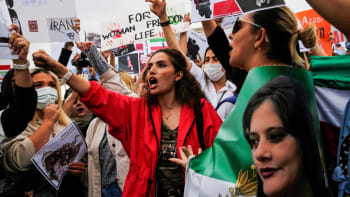
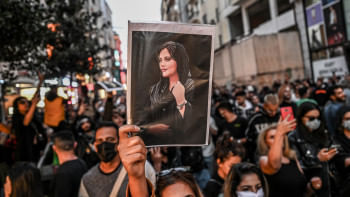
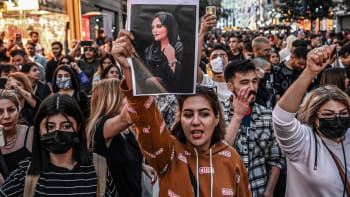

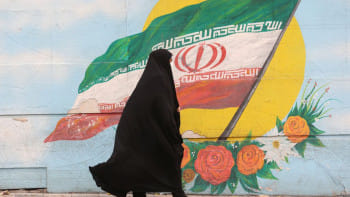



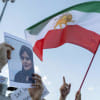

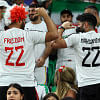
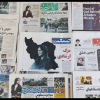


Comments